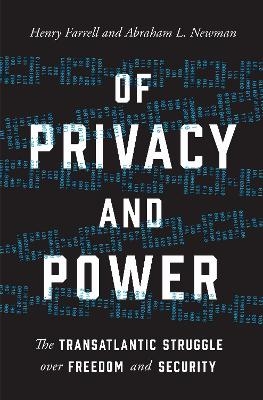
Of Privacy and Power
The Transatlantic Struggle over Freedom and Security
Seiten
2019
Princeton University Press (Verlag)
978-0-691-18364-0 (ISBN)
Princeton University Press (Verlag)
978-0-691-18364-0 (ISBN)
How disputes over privacy and security have shaped the relationship between the European Union and the United States and what this means for the futureWe live in an interconnected world, where security problems like terrorism are spilling across borders, and globalized data networks and e-commerce platforms are reshaping the world economy. This
How disputes over privacy and security have shaped the relationship between the European Union and the United States and what this means for the future
We live in an interconnected world, where security problems like terrorism are spilling across borders, and globalized data networks and e-commerce platforms are reshaping the world economy. This means that states’ jurisdictions and rule systems clash. How have they negotiated their differences over freedom and security? Of Privacy and Power investigates how the European Union and United States, the two major regulatory systems in world politics, have regulated privacy and security, and how their agreements and disputes have reshaped the transatlantic relationship.
The transatlantic struggle over freedom and security has usually been depicted as a clash between a peace-loving European Union and a belligerent United States. Henry Farrell and Abraham Newman demonstrate how this misses the point. The real dispute was between two transnational coalitions—one favoring security, the other liberty—whose struggles have reshaped the politics of surveillance, e-commerce, and privacy rights. Looking at three large security debates in the period since 9/11, involving Passenger Name Record data, the SWIFT financial messaging controversy, and Edward Snowden’s revelations, the authors examine how the powers of border-spanning coalitions have waxed and waned. Globalization has enabled new strategies of action, which security agencies, interior ministries, privacy NGOs, bureaucrats, and other actors exploit as circumstances dictate.
The first serious study of how the politics of surveillance has been transformed, Of Privacy and Power offers a fresh view of the role of information and power in a world of economic interdependence.
How disputes over privacy and security have shaped the relationship between the European Union and the United States and what this means for the future
We live in an interconnected world, where security problems like terrorism are spilling across borders, and globalized data networks and e-commerce platforms are reshaping the world economy. This means that states’ jurisdictions and rule systems clash. How have they negotiated their differences over freedom and security? Of Privacy and Power investigates how the European Union and United States, the two major regulatory systems in world politics, have regulated privacy and security, and how their agreements and disputes have reshaped the transatlantic relationship.
The transatlantic struggle over freedom and security has usually been depicted as a clash between a peace-loving European Union and a belligerent United States. Henry Farrell and Abraham Newman demonstrate how this misses the point. The real dispute was between two transnational coalitions—one favoring security, the other liberty—whose struggles have reshaped the politics of surveillance, e-commerce, and privacy rights. Looking at three large security debates in the period since 9/11, involving Passenger Name Record data, the SWIFT financial messaging controversy, and Edward Snowden’s revelations, the authors examine how the powers of border-spanning coalitions have waxed and waned. Globalization has enabled new strategies of action, which security agencies, interior ministries, privacy NGOs, bureaucrats, and other actors exploit as circumstances dictate.
The first serious study of how the politics of surveillance has been transformed, Of Privacy and Power offers a fresh view of the role of information and power in a world of economic interdependence.
Henry Farrell is professor of political science and international affairs at George Washington University. He is the author of The Political Economy of Trust. Farrell lives in Bethesda, Maryland. Twitter @henryfarrell. Abraham L. Newman is professor of government in the Edmund A. Walsh School of Foreign Service at Georgetown University. His books include Voluntary Disruptions and Protectors of Privacy. Newman lives in Washington, DC. Twitter @ANewman_forward
| Erscheinungsdatum | 16.03.2019 |
|---|---|
| Zusatzinfo | 6 b/w illus. 1 table. |
| Verlagsort | New Jersey |
| Sprache | englisch |
| Maße | 155 x 235 mm |
| Themenwelt | Sozialwissenschaften ► Politik / Verwaltung ► Europäische / Internationale Politik |
| Sozialwissenschaften ► Politik / Verwaltung ► Politische Theorie | |
| Wirtschaft ► Volkswirtschaftslehre ► Wirtschaftspolitik | |
| ISBN-10 | 0-691-18364-3 / 0691183643 |
| ISBN-13 | 978-0-691-18364-0 / 9780691183640 |
| Zustand | Neuware |
| Haben Sie eine Frage zum Produkt? |
Mehr entdecken
aus dem Bereich
aus dem Bereich
Studienbuch
Buch | Hardcover (2023)
De Gruyter Oldenbourg (Verlag)
44,95 €
erfolgreiche Interessenvertretung durch Prozesskompetenz im komplexen …
Buch | Hardcover (2023)
Wiley-VCH (Verlag)
42,00 €


